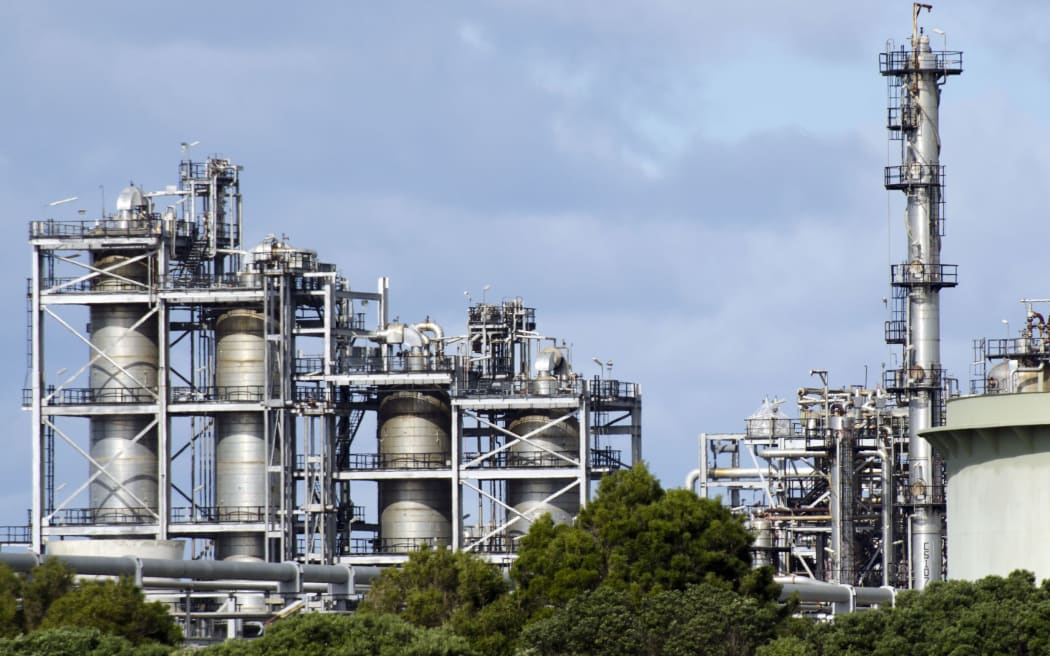Petrol sludge containing highly toxic alkyl-leads - later banned from petrol in New Zealand - was dumped near the coast at Marsden Point, say two former workers.

A file photo of the Marsden Point oil refinery south of Whangarei Photo: 123rf.com
The two men who worked at the facility near Whangarei told Checkpoint the lead additives triethyl lead and trimethyl lead were imported as liquids and added to petrol by workers at the refinery.
Brian Arndt and Brian Tobin - who started working at the refinery in 1965 - said they believed they were exposed to great and unnecessary risk during the process, but that the extent of that risk was withheld from them.
They said they remembered their time there clearly, and Mr Arndt even mixed the lead into petrol, before seeing the sludge from the tanks used in the blending process dumped onto sand near the refinery.
The Northland Regional Council said that "may" have happened, but regulatory services group manager Colin Dall said the council was not sampling for the leads in question.
"One thing we could look at is to start including some sampling for organoleads."
Lead was banned from petrol in New Zealand in 1996.
The refinery's communications manager, Greg McNeill, said the company knew of a "past land farm" in the area that the workers had described.
Land farming remained a consented, environmentally sustainable practice to return contaminated soil - including sludge - to an acceptable quality for land use, he said.
When last measured in 1995, the total lead content of the land farm was 33 parts per million, well below the national environmental standard for safe residential use, Mr McNeil said.
He said if any new information was made available, the refinery would readily carry out further testing.
Workers unaware of risks
Mr Ardnt and Mr Tobin, who worked in the refinery in the 1960s and 1970s, said they were never warned of the risks of handling the lead.
"The lead was added to the petrol blend at Marsden Point refinery by way of coming in drums of 205 litres, weighing approximately 360 kilos each, that were manually entered into the blending vessels," Mr Ardnt said.
He would remove the cap, and then the internal plug, coming within about 60cm of the surface of the lead.
"Even though you had an air mask on you could smell it. And we just had plain white overalls and if they were available, a pair of underpants to wear under them and a sweatshirt in the winter."
Mr Ardnt started at the refinery in April, 1965 - 13 months after Medical Officer of Health E Simpson wrote a letter to the Whangarei district officer of the Department of Labour, warning of the dangers of lead.
"There is, at the Marsden Point Oil Refinery, a section of the plant wherein employees will be handling one or both of these compounds... both are extremely toxic... The risk is present wherever the compounds are handled," the medical officer wrote.
Mr Tobin said workers were told to wear protective clothing, but were not told of the extreme dangers of being exposed to lead.
"We were told this was nasty stuff, we weren't told how nasty."
In December 1965, the director of the division of public health at the Department of Health, JF Copplestone, wrote to the medical officer of health in Whangarei.
"It is essential that men working on this task shall be under adequate medical supervision as the risk of lead poisoning is considerable. Organic lead compounds pass freely through the skin."
The refinery said it had always acted in accordance with the medical guidelines for the handling of lead and carried out regular medical checks for anyone involved in the handling of lead on site.
It said it had evidence of workers wearing the appropriate personal protection when the lead plant was decommissioned and that access to this plant was always restricted.
Years of cancer
Mr Ardnt's body has been riddled with tumours since the 1980s.
Doctors first found a squamous carcinoma and then a large tumour around his left lung. In 2009 an tumour was found in his right breast; in 2012 he had radical radiation and hormonal treatment for another tumour on his prostate, and then another tumour was found in his left breast.
"In 2013 my oncologist sat down with me and said a peer review had been done by his colleagues, they couldn't figure out why I had all these cancers and problems.
"I ran through my work history and life and when I got to the work at the refinery, he said 'no, not hydrocarbon, different cancer', and when I said triethyl lead he said 'oh my god, you've got to be kidding me'."
He said he thought about the warning letters they never saw, and the simple overalls they wore, and opening the tanks to get the leads out.
"If I took a drum of that lead into their offices now and opened it they would throw a fit. I'd be called a terrorist."

